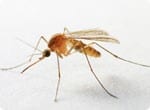Sea Creatures May Be Used As A New Form Of Mosquito Control
Sea Creatures May Be Used As A New Form Of Mosquito Control
Mosquitoes are becoming more threatening by the year. As the summer season grows longer, mosquitoes survive for longer periods, and naturally, their populations grows larger. After two years of Zika, experts are predicting that mosquito-borne diseases will only increase in prevalence in the upcoming years. Although researchers are developing many cutting edge mosquito control methods, and mosquito-borne disease research is making strides, there is no denying that we humans need all the help we can get when it comes to mosquito control. Luckily, experts have just discovered a particular animal that may be able to serve as a form of mosquito control. It turns out that a shrimp-like marine animal decreases mosquito population sizes.
The crustaceans known as “Copepods” are tiny creatures that can be found in just about every type of waterbody. All fifteen thousand or more copepod species feed on algae, plankton and, as it turns out, mosquitoes. The feeding habits of copepods have not always been well known, but now researchers believe that at least some of these sea creatures eat mosquito larvae regularly. According to Jamie Pierson, an assistant professor at the Horn Point Laboratory in Cambridge copepods can reduce the mosquito population to the point where pesticides would no longer be necessary.
Research concerning copepods as a potential mosquito control method is currently being carried out in Maryland. There exists about sixty species of mosquitoes in Maryland, and some of these species lay their eggs in water, while others lay their eggs right above water. Out of these sixty mosquitoes species, it is the tiger mosquito that interests researchers the most. These mosquitoes were first discovered in America in 1987, and they are particularly dangerous as they can lay their eggs in a variety of different areas containing water. These mosquitoes also spread Zika and West Nile. Fortunately, research has shown that copepods feed on mosquito larvae. In fact, some countries have already found success with the application of copepods as a form of mosquito control. The copepod crustaceans are placed near areas where standing water can easily accumulate, such as tires, barrels and cisterns.
Do you believe that copepods could make all other forms of pest control unnecessary?






